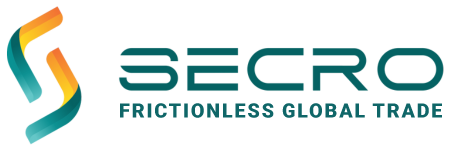In this analysis, we compared two scenarios for a bank’s $100 million portfolio of commodity trade finance loans: one where 100% of the portfolio is secured with Secro tokenized e-bills of lading (eBL) and another where only 70% of the portfolio is secured due to the use of couriered paper bills of lading.
The use of Secro electronic bills of lading (eBL) can enable achieving 100% securitization of the portfolio by eliminating the time currently required to courier and process paper original bills of lading from the place of issuance to the physical location of the financial institution. Secro eBLs provide immediate, secure, and verifiable electronic transfer of the title document, ensuring that banks can promptly secure the collateral and apply the favorable risk weights without delays. This not only streamlines the process but also enhances the security and efficiency of trade finance operations, further optimizing the capital requirements and reducing the overall cost of capital.
Key metrics considered in the analysis include Credit Conversion Factors (CCF), first loss treatment, Risk-Weighted Assets (RWA), and Weighted Average Cost of Capital (WACC) for each tranche.
The analysis shows that securitizing the entire portfolio with Secro eBL significantly reduces RWAs and capital requirements due to lower risk weights assigned to secured tranches. Specifically, the total RWA for the 100% secured scenario is $136 million, compared to $149.2 million for the 70% secured scenario. Consequently, the capital requirements are lower in the 100% secured scenario. The WACC for the first loss tranche is higher due to its high-risk weight, but the overall WACC distribution shows that securing a larger portion of the portfolio reduces the cost of capital for mezzanine and senior tranches. This analysis underscores the importance of maximizing the secured portion of a portfolio with Secro tokenized bill of lading to optimize regulatory capital efficiency and reduce funding costs.
Comparison Table
| Item | 100% Securitization with Secro eBL | 70% Securitization with paper BL |
| Credit Conversion Factor (CCF) | 20% | 50% (unsecured portion) |
| First Loss Treatment | 1250% Risk Weight | 1250% Risk Weight |
| Mezzanine Tranche Treatment | 20% Risk Weight | 20% (secured), 100% (unsecured) |
| Senior Tranche Treatment | 10% Risk Weight | 10% (secured), 50% (unsecured) |
| Tranche | RWA (100% Secro eBL) | RWA (70% paper BL) |
| First Loss Tranche | $125 million | $125 million |
| Mezzanine Tranche | $4 million | $2.8 million (secured) |
| $6 million (unsecured) | ||
| Senior Tranche | $7 million | $4.9 million (secured) |
| $10.5 million (unsecured) | ||
| Total RWA | $136 million | $149.2 million |
| Tranche | WACC (100% Secro eBL) | WACC (70% paper BL) |
| First Loss Tranche | 9.191% | 8.380% |
| Mezzanine Tranche | 0.294% | 0.590% |
| Senior Tranche | 0.515% | 1.031% |
Capital Requirements
| Metric | 100% Securitization with Secro eBL | 70% Securitization with paper BL |
| CET1 Requirement | $6.12 million | $6.714 million |
| Tier 1 Requirement | $8.16 million | $8.952 million |
| Total Capital Requirement | $10.88 million | $11.936 million |

